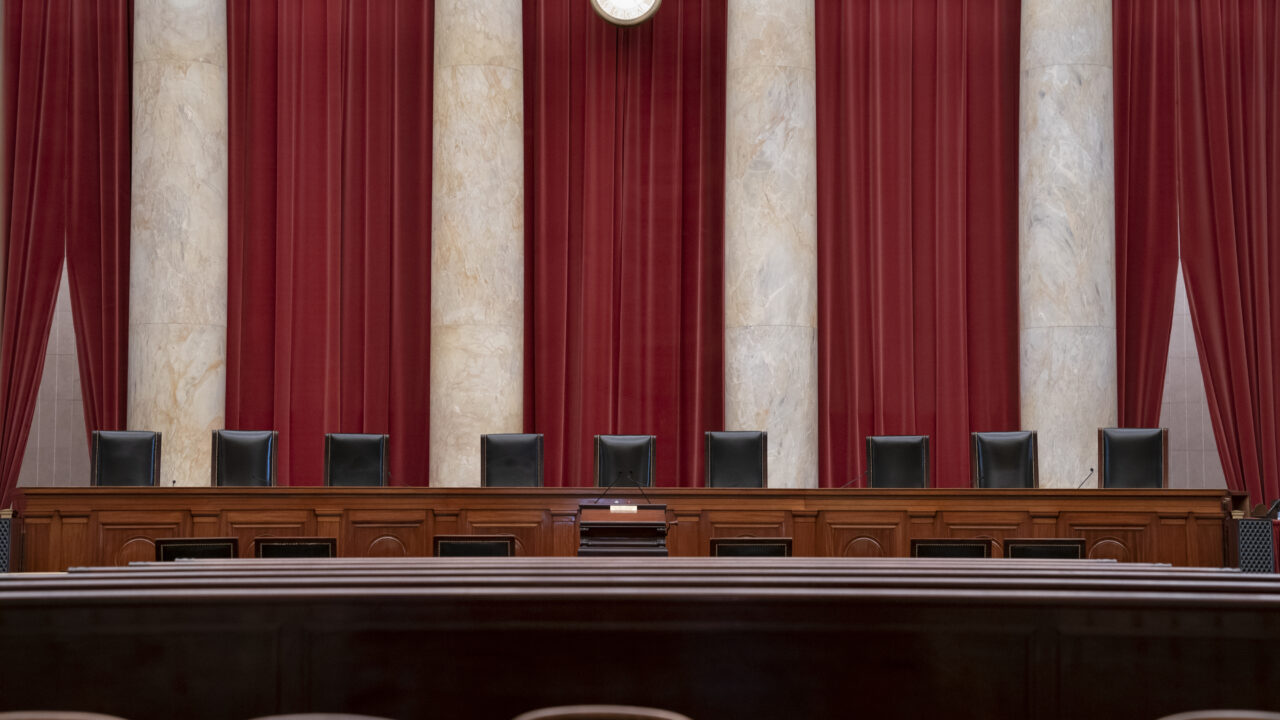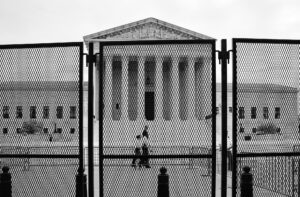Supreme Court 101: What is Judicial Review?
It's where the high court gets its power—and it's not even mentioned in the Constitution. The empty courtroom is seen at the U.S. Supreme Court in Washington on June 24, 2019. (AP Photo/J. Scott Applewhite, File)
This is Part of the "The Supreme Court’s War on the Future" Dig series
The empty courtroom is seen at the U.S. Supreme Court in Washington on June 24, 2019. (AP Photo/J. Scott Applewhite, File)
This is Part of the "The Supreme Court’s War on the Future" Dig series
The Supreme Court derives its power from a principle known as “judicial review.”
Judicial review refers to the authority of courts to declare acts of the executive and the legislature unconstitutional. (As a correlate, judicial review also allows courts to uphold the constitutionality of executive and legislative actions and policies.)
The power of judicial review is not mentioned in the Constitution. The principle was advanced by Alexander Hamilton in the Federalist Papers, a collection of 85 essays penned by Hamilton, James Madison and John Jay in 1787-88 to advocate for ratification of the Constitution.
Writing under the pseudonym “Publius,” Hamilton outlined the principles of judicial review in Federalist No. 78:
“Whoever attentively considers the different departments of power must perceive, that, in a government in which they are separated from each other, the judiciary, from the nature of its functions, will always be the least dangerous to the political rights of the Constitution; because it will be least in a capacity to annoy or injure them…
“The judiciary, on the contrary, has no influence over either the sword or the purse; no direction either of the strength or of the wealth of the society; and can take no active resolution whatever. It may truly be said to have neither FORCE nor WILL, but merely judgment…
“The interpretation of the laws is the proper and peculiar province of the courts. A constitution is, in fact, and must be regarded by the judges, as a fundamental law. It therefore belongs to them to ascertain its meaning, as well as the meaning of any particular act proceeding from the legislative body. If there should happen to be an irreconcilable variance between the two, that which has the superior obligation and validity ought, of course, to be preferred; or, in other words, the Constitution ought to be preferred to the statute, the intention of the people to the intention of their agents.”
These principles became actual governing features of U.S. law when they were embraced by the Supreme Court in two of its earliest decisions: Ware v. Hylton (1796), which held that the court had the power to declare state laws null and void if inconsistent with federal law; and Marbury v. Madison (1803), which held that the court had the power to declare acts of Congress unconstitutional.
In language echoing Hamilton, Chief Justice John Marshall held in Marbury:
“It is emphatically the duty of the Judicial Department to say what the law is. Those who apply the rule to particular cases must, of necessity, expound and interpret the rule. If two laws conflict with each other, the Court must decide on the operation of each.“
“If courts are to regard the Constitution, and the Constitution is superior to any ordinary act of the legislature, the Constitution, and not such ordinary act, must govern the case to which they both apply.”
Since Marbury, the Supreme Court has exercised the power of judicial review to overturn state and federal laws on numerous occasions. According to the Library of Congress and the Congressional Research Service, through June 27, 2016, the Supreme Court had declared 180 acts of Congress and 1087 state statutes and ordinances unconstitutional. It also had overruled, in whole or in part, 236 of its prior decisions.
The principle of judicial review, together with the Supremacy Clause of the Constitution (Art. VI), gives the Supreme Court the last word in setting national policy on matters of central importance to all Americans. It is why we engage in heated debate about the political direction of the court, and why we fight over who gets appointed to serve on the high tribunal.
Your support matters…Independent journalism is under threat and overshadowed by heavily funded mainstream media.
You can help level the playing field. Become a member.
Your tax-deductible contribution keeps us digging beneath the headlines to give you thought-provoking, investigative reporting and analysis that unearths what's really happening- without compromise.
Give today to support our courageous, independent journalists.

You need to be a supporter to comment.
There are currently no responses to this article.
Be the first to respond.